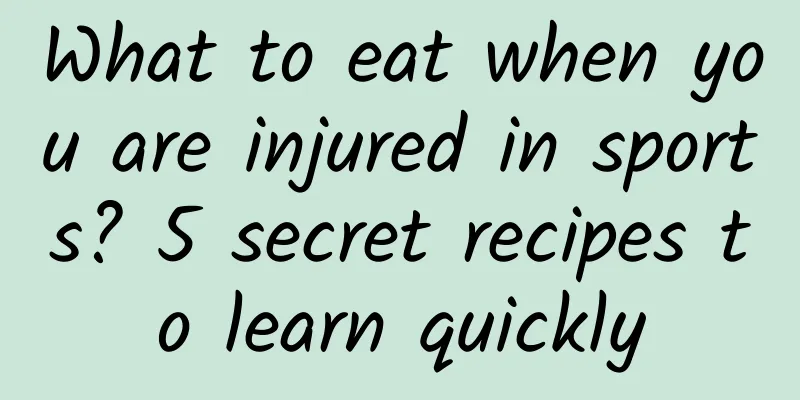What to eat when you are injured in sports? 5 secret recipes to learn quickly

|
"Nutritionist, I want to lose weight!" In the health classroom, before Lin even had time to sit down, he expressed his needs in a clear and cheerful manner. "I injured my foot playing basketball, and my weight has been increasing rapidly in the past three months! Nutritionist, is there anything I can eat to get better quickly?" He covered his face with his hands and rubbed them up and down. "I gained 5 kilograms in three months. I can't stand it anymore!" Sports injuries, any injuries that occur during any sport can be included in this scope. From minor abrasions, bruises and sprains to major inflammation, dislocations and fractures. In short, no matter what kind of injury it is, as long as it occurs during sports, it can be listed one by one. However, in the sports medicine classification, sports injuries do not have so many classification attributes. Generally speaking, medicine divides muscle soreness into two categories: one is called exercise-induced muscle damage (EIMD); the other is called delayed onset musclesoreness (DOMS). As the name suggests, exercise-induced muscle damage (EIMD) is "immediate" muscle damage that occurs during exercise, including sprains, dislocations, fractures, etc., and it will not recover on the same day, but will take more than several days. Delayed onset muscle soreness (DOMS) starts "24 to 48 hours after exercise", and the duration of soreness also represents the degree of sports injury. Before introducing dietary supplements, we must first explain the two main purposes of nutrition in sports injuries. First, it reduces current muscle loss, and second, it relieves the inflammatory response after injury. This means that the former is an immediate supplement after exercise, so that the body has enough raw materials to repair the current damage; the latter reduces inflammation and fatigue after injury. Whether you eat it immediately after exercise or increase the intake in your daily diet, there will not be much difference. Next, the dietary secrets are revealed! Dietary secret 1: Reduce current muscle loss - "Carbohydrate + Protein" Take it within two hours after exercise. The protein supplement is 0.3 grams per kilogram, and then multiplied by 2~3, which is the sugar content. Do you feel a little foggy after reading this? For example, for a 60 kg athlete, multiply by 0.3, which equals 20 grams, which is the protein intake after exercise. Multiply that by 2-3, and you get about 40-60 grams of sugar. Take protein as an example. One tea egg or 250cc of soy milk contains 7 grams of protein. If it is whey protein powder, you can just brew it according to the protein ratio on the nutrition label. As for sugar, a NT$20 sweet potato (about 150 grams) contains 45 grams of sugar, while a banana the length of an index finger or a fruit the size of a baseball also contains 15 grams of sugar. Dietary secret 2: Relieve inflammation - "polyunsaturated fatty acids" Many studies have pointed out that "polyunsaturated fatty acids (n-3 family)" have the effect of alleviating inflammation after exercise. In addition, this is the only supplement that has been proven to be effective in treating delayed onset muscle soreness (DOMS). If you are a meat eater, you can choose fish oil supplements; if you are a vegetarian, there are currently vegetarian fish oils available for consumers to choose from. Diet secret 3: Increase antioxidants - "cherries" and various fruits and vegetables Hundreds of kinds of fruits and vegetables. However, foods that are currently pointed out to have antioxidant effects and have been proven to be effective in human trials, such as berries such as cherries, grapes, blueberries, plant polyphenols in fruits and vegetables, carrots, etc., are all food ingredients that can be supplemented. In addition, there are some good foods that can resist fatigue and reduce muscle loss, such as catechins in green tea. Human experiments have shown that they may reduce muscle pain and discomfort after exercise; pomegranates may prevent muscle loss after inflammation. Therefore, drinking some green tea and eating more carrots on a daily basis can help relieve the damage after exercise! Diet Secret 4: Supplements that have yet to be determined - "Vitamin C and E", "Alpha Lipoic Acid", "Co-enzyme Q10" Currently, there are no consistent results in human studies on the well-known supplements "vitamins C and E" for the relief of sports injuries. If you take them regularly, there is no need to stop, you can supplement according to your personal habits. "Alpha lipoic acid" is still controversial. From the current research, there are more ineffective conclusions than effective conclusions. So if you are not taking it, I would suggest that you don't spend extra money to buy it. "Co-enzyme Q10", supplementation is not recommended. The American College of Sports Medicine (ACSM) announced in 2009 that "there is no way to increase the effectiveness of exercise." Diet secret recipe 5: It is also good to supplement it regularly - "milk" and "soy milk" "Milk" and "soy milk" are sources of high-quality protein and have their own benefits for the human body. Take milk or whey protein as an example. Milk and whey protein are high in leucine and are quickly absorbed by the human body. Soy milk is derived from soybeans, which are rich in antioxidants and help relieve inflammatory responses after injuries. postscript: The reason why Lin became fat was that he was injured and his exercise volume dropped drastically, but his food intake did not change, which caused his weight to soar. Before the injury, he said that after playing basketball, he would always meet with classmates to eat fried chicken or barbecue with beer, and he only ate a few vegetables a day. Anyway, the amount of exercise was high, so young people were not afraid at all. So, I asked him to increase his vegetable intake, which should account for about half of the meal; and to have a cup of unsweetened soy milk with sugar-free tremella juice as a snack between meals; and to change his exercise to focus on upper body exercises, such as horizontal bar, dumbbells, sit-ups, etc., to first get through the recovery period of his foot injury. Three months later, Lin happily decided to stop the weight loss treatment. What made him happy was not that he lost three kilograms in three months, but that his foot injury recovered ahead of schedule, so he could return to the basketball court and resume his favorite sport - "playing basketball". Source: Sousa, Mónica, Vítor H. Teixeira, and José Soares. "Dietary strategies to recover from exercise-induced muscle damage." International journal of food sciences and nutrition 65.2 (2014): 151-163. This article comes from: Nutrition and Medical Network ※For more information, please visit the Nutrition and Medical Network |
<<: Eat corn to lose weight? 1.3 corns = 1 bowl of rice calories
>>: Fat terminator! Enoki mushroom ice cubes are great in cooking
Recommend
Women should pay attention to the typical symptoms of ectopic pregnancy
Among gynecological diseases, ectopic pregnancy i...
What are the clinical manifestations of irregular menstruation?
What are the clinical manifestations of irregular...
Do you know what are the symptoms of gynecological disease vulvar leukoplakia?
What are the symptoms of gynecological vulvar leu...
What are the main causes of vaginitis?
Vaginitis is also a common gynecological disease ...
Chronic uterine involution in parturients should be alert to the occurrence of cervical hypertrophy
The cervix is a very important organ in the fem...
What tests should be done for irregular menstruation
I believe everyone knows what impact irregular me...
What is the pain of pelvic inflammatory disease?
Pelvic inflammatory disease is a gynecological di...
Why does yellow water keep flowing after abortion?
If you continue to have yellow water discharge af...
How to take care of uterine fibroids after surgery? How to take care of uterine fibroids after surgery
Paying attention to the postoperative recovery of...
What are the symptoms of uterine fibroids? Is increased vaginal discharge a manifestation of uterine fibroids?
There are also many symptoms of uterine fibroids....
Experts explain how to effectively prevent dysmenorrhea
Dysmenorrhea is a very common phenomenon for fema...
Malignant brain tumor expert doctor satiety weight loss
Doctors work very hard and often neglect health c...
TOP20 quick weight loss foods ranking! (superior)
TOP 1/Apple Apples contain potassium, which can e...
What is the treatment for habitual miscarriage?
What is the treatment for habitual abortion? Habi...
What to eat when bleeding from uterine fibroids? What to eat when bleeding from uterine fibroids?
What to eat when bleeding from uterine fibroids? ...









